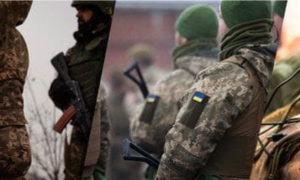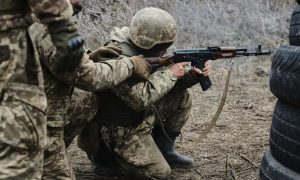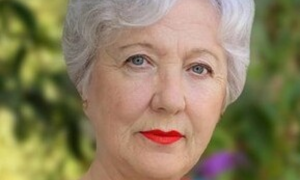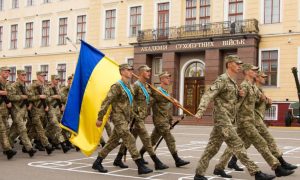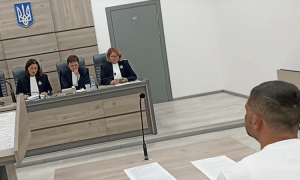Aleksandr Litvinyuk is not due to complete his jail term and post-prison restrictions until the mid-2030s, by which time he would be over 75. Armyansk Prosecutor’s Office refused to put Forum 18 through to Prosecutor Minigul Saddykova, who led the prosecution case in court. Litvinyuk is among 12 Jehovah’s Witnesses from Russian-occupied Crimea now jailed for at least six years to punish their exercise of freedom of religion or belief. Two more are serving suspended sentences including Darya Kuzio, wife of one of the prisoners.
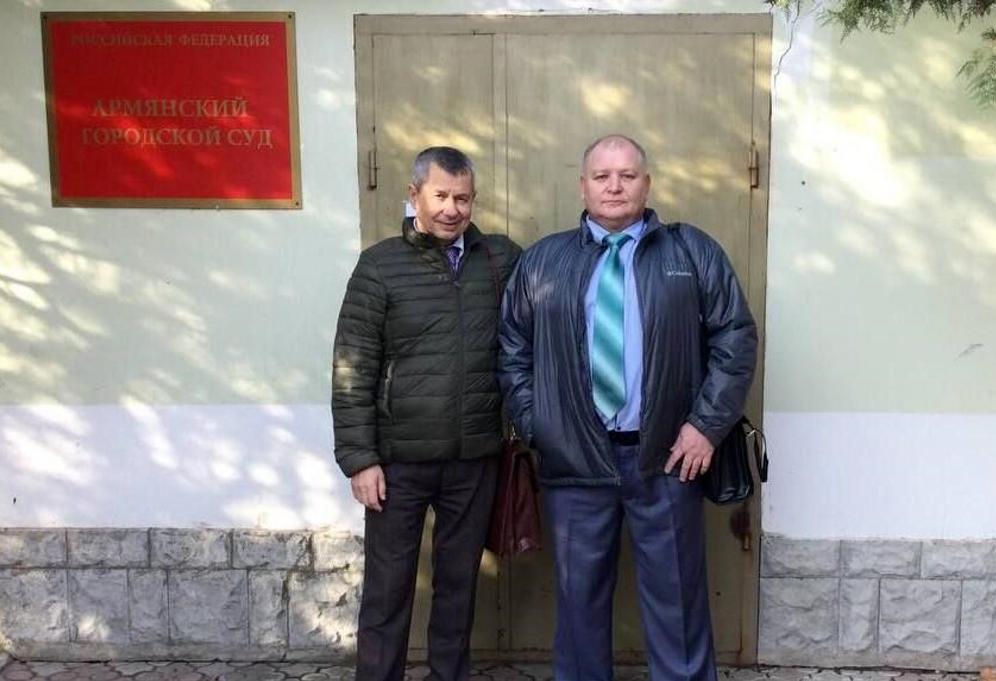
On 1 December 2022, the Court in the northern Crimean town of Armyansk jailed two Jehovah’s Witnesses for six years each in a general regime labour camp. On 27 February 2023, the Court in the southern Crimean city of Yalta jailed three Jehovah’s Witnesses for more than six years each in a general regime labour camp. The fourth – whose husband was among those jailed – was given a suspended sentence because of their two young children.
Armyansk City Court jailed Aleksandr Dubovenko (now 49) and Aleksandr Litvinyuk (now 62) after an eight-month trial, most of which was closed to the public. The Judge also handed down to each a 5-year ban on educational activity, speaking publicly and publishing in the media and on the internet after they complete their prison terms (see below).
Unless the sentences are changed on appeal, the two men are set to complete all their post-prison restrictions only in the mid-2030s, by which time Litvinyuk would be over 75.
An official of Armyansk Prosecutor’s Office refused to put Forum 18 through to Prosecutor Minigul Saddykova, who led the prosecution case in court. Asked why her colleague had called for long prison terms on Dubovenko and Litvinyuk to punish their exercise of freedom of religion or belief, she responded: “We can’t give such information by phone. Anyway, they’re appealing against the verdict” (see below).
Yalta City Court jailed Taras Kuzio (now 44), Sergei Lyulin (now 38) and Pyotr Zhiltsov (now 35) after an eleven-month trial (see below).
Testifying for the prosecution were three “secret” witnesses, as well as an independent “expert” Olga Griva, a University professor who also teaches at a Moscow Patriarchate Seminary. She had also testified in court in an earlier Jehovah’s Witness case (see below).
Forum 18 asked Griva whether there was not a conflict of interest for a prosecution “expert” affiliated with one faith to be commenting on the religious views and activities of individuals of another faith. “There was no conflict of interest,” she insisted. “I brought my professional knowledge and experience to the case” (see below).
All were punished for organising, participating in or financing the activity of an “extremist” organisation that courts in the Russian Federation had banned. Russia’s Supreme Court banned all Jehovah’s Witness activity in 2017. Russia has imposed this ban in Crimea, which it illegally occupied in March 2014 (see below).
The new convictions in Armyansk and Yalta bring to 12 the number of Crimeans the Russian authorities have jailed for exercising freedom of religion or belief. All are serving jail terms of at least six years. Two more are serving suspended sentences. All 14 are Jehovah’s Witnesses (see list at foot of article).
Four of the 12 given jail terms were illegally transferred to prisons in Russia to serve their sentences, despite this breaking the Geneva Convention (IV) relative to the Protection of Civilian Persons in Time of War. The other 8 are in Investigation Prison in the Crimean capital Simferopol as they await appeal hearings (see below).
Once they complete their jail terms, the 12 prisoners of conscience will face years of further restrictions (see below).
Crimean Muslim Renat Suleimanov, who was earlier jailed on “extremism”-related charges, has completed his jail term and his one year post-prison restrictions. He is now under eight years of administrative supervision, where he has to report regularly to the police, cannot leave Crimea without permission and must be home every night. His bank accounts remain blocked (see below).
Further criminal cases are under investigation against other Crimean Jehovah’s Witnesses. Two more Crimean Jehovah’s Witnesses who have left the peninsula are on Russia’s wanted list and may have Interpol Red Notices against them (see forthcoming F18News article).
Years of post-prison restrictions
Even when the jailed Jehovah’s Witnesses complete their prison terms, they will remain under restrictions, including post-prison restrictions, post-prison bans on specific activities and blocks on any bank accounts.
Crimean Muslim Renat Suleimanov was freed from labour camp In December 2020 after completing his four-year sentence. He had been punished on “extremism”-related charges for meeting with other Muslims in mosques to discuss their faith, and accused of alleged membership of the Tabligh Jamaat Muslim missionary movement (which Russia’s Supreme Court banned in 2009). In December 2021, Suleimanov’s post-prison restrictions ended.
Suleimanov is now under administrative supervision lasting eight years from December 2021, imposed by Simferopol District Court. During this period, he must report to the police twice a month, is not allowed to leave the Crimean peninsula without permission, and has to be at home each night from midnight until 4 am. Courts rejected Suleimanov’s appeals against this administrative supervision.
Suleimanov remains on the Russian Federal Financial Monitoring Service (Rosfinmonitoring) “List of Terrorists and Extremists”, whose assets banks are obliged to freeze (although small transactions are permitted).
Armyansk: Raids, criminal cases
On 2 August 2021, Russian FSB Senior Investigator Vitaly Vlasov opened a criminal case against two Jehovah’s Witnesses in the northern Crimean town of Armyansk, Aleksandr Fyodorovich Dubovenko (born 31 March 1973) and Aleksandr Viktorovich Litvinyuk (born 3 November 1960). He accused them of using the video conferencing site Zoom to “attract new members to the organisation”.
Early on 5 August 2021, Russian FSB, police and other officers raided at least eight homes in Armyansk of those they suspected of being Jehovah’s Witnesses. Officers arrived in minibuses and cars without registration numbers, Jehovah’s Witnesses say. They searched Dubovenko’s home (in his absence) and Litvinyuk’s home for nine hours, seizing computers, notes on religious themes and property records.
Officers took Litvinyuk to Crimea’s capital Simferopol where, on 6 August 2021, the city’s Kiev District Court ordered him held under house arrest.
When Dubovenko returned to Armyansk from visiting relatives on 9 August 2021, officers arrested him and took him to the Russian FSB headquarters in Simferopol. At the same time, officers conducted a second search of his home in Armyansk, seizing more electronic devices. Simferopol’s Kiev District Court also ordered Dubovenko held under house arrest.
Investigators had Dubovenko and Litvinyuk added on 10 August 2021 to the Russian Federal Financial Monitoring Service (Rosfinmonitoring) “List of Terrorists and Extremists”, whose assets banks are obliged to freeze (although small transactions are permitted).
Armyansk: Two 6-year jail terms, plus 5-year post-prison bans
On 5 April 2022, the trial of Dubovenko and Litvinyuk began at Armyansk City Court. “The whole trial,” the Crimean Process human rights group noted, “was closed, without access to the courtroom for the public.” Numerous closed hearings took place in the case, according to court records. The Judge rejected numerous procedural complaints submitted by the defence, according to the court website.
Minigul Saddykova of Armyansk Prosecutor’s Office demanded in court that Dubovenko and Litvinyuk each be jailed for six years, noted Crimean Process, which tracks trials in the Russian-occupied peninsula.
On 1 December 2022, Judge Tatyana Fedeneva convicted Dubovenko and Litvinyuk under Russian Criminal Code Article 282.2, Part 1 (“Organisation of the activity of a social or religious association or other organisation in relation to which a court has adopted a decision legally in force on liquidation or ban on the activity in connection with the carrying out of extremist activity”). This Article carries a possible punishment of six to 10 years’ imprisonment or a fine of 400,000 to 800,000 Roubles.
The Judge jailed Dubovenko and Litvinyuk for six years each in a general regime labour camp. She also handed down to each a 5-year ban on educational activity, speaking publicly and publishing in the media and on the internet after they complete their prison terms. They will also be under one year of post-prison restrictions on freedom, which will prevent them from moving from or leaving Armyansk without special permission, the court website noted on 1 December 2022 (without naming the two men).
Officials took Dubovenko and Litvinyuk into custody in the courtroom after the verdicts were handed down and took them to the Investigation Prison in the regional capital Simferopol. They are due to be held there until their appeal is heard.
Russian FSB Senior Investigator Vlasov – who had opened the criminal case against Dubovenko and Litvinyuk in 2021 – did not answer his phone each time Forum 18 called on 9 March 2023 or respond to written questions sent the same day.
An official of Armyansk Prosecutor’s Office refused to put Forum 18 through on 10 March to Prosecutor Saddykova, who led the prosecution case in court. Asked why her colleague had called for long prison terms on Dubovenko and Litvinyuk to punish their exercise of freedom of religion or belief, she responded: “We can’t give such information by phone. Anyway, they’re appealing against the verdict.”
Dubovenko and Litvinyuk’s appeal against their conviction reached Crimea’s Supreme Court in Simferopol on 20 February 2023. The case has been assigned to Judge Galina Redko, according to court records. The first hearing in the appeal is due on 16 March.
Yalta: Criminal cases against five
In March 2019, Russian officers raided eight Jehovah’s Witness family homes in and around Yalta. Officers seized religious literature, money and other documents, and took several people for interrogation.
In March 2021, Russian FSB officers “detected” a group of Jehovah’s Witnesses in the southern Crimean city of Yalta. A 27 January 2023 Crimean Investigative Committee statement noted that the group had “decided to continue underground extremist activity” despite Russia’s Supreme Court ban on Jehovah’s Witness activity in 2017.
“Meetings and lectures were organised in private households of supporters of the sect,” the statement added, “a financial and economic base was formed, and funds were collected from citizens in the form of donations to further ensure the activities of the extremist cell.”
Crimea’s Investigative Committee then took over the investigation from the Russian FSB. It commissioned a “complex religious studies expert analysis” of material, as well as 13 financial “expert analyses”. It said it had questioned “a wide circle of people from among the participants in the activity of the extremist organisation – about 100 people”.
Senior Investigator Vladimir Novikov of the Russian Investigative Committee’s Department for Investigating Especially Important Cases opened the criminal cases which were later combined into one, targeting five people: Darya Nikolayevna Kuzio (born 13 March 1982) and her husband Taras Grigoryevich Kuzio (born 19 June 1978), Sergei Aleksandrovich Lyulin (born 24 September 1984), Pyotr Alekseyevich Zhiltsov (born 19 August 1987) and Tadevos Derenikovich Manukyan (born 24 October 1981).
Taras Kuzio spent 1 day in a police temporary detention centre and 486 days under house arrest. Zhiltsov spent 2 days in a police temporary detention centre and 346 days under house arrest. Lyulin (who had tried to flee to Ukraine after the case was launched) spent 3 days in a police temporary detention, 200 days in Investigation Prison and 132 days under house arrest. Taras Kuzio, Zhiltsov and Lyulin then lived under restrictions on certain activities while the trial continued. Darya Kuzio had to sign a pledge not to leave the area.
Investigators had all five (including Tadevos Manukyan) added on 22 February 2022 to the Russian Federal Financial Monitoring Service (Rosfinmonitoring) “List of Terrorists and Extremists”, whose assets banks are obliged to freeze (although small transactions are permitted).
Manukyan – who appears to have left Crimea – is among several Jehovah’s Witnesses on Russia’s Interior Ministry wanted list (see forthcoming F18News article).
Yalta: Secret witnesses, “expert” for the prosecution
On 4 April 2022, the trial of the four Jehovah’s Witnesses – Darya Kuzio, Taras Kuzio, Sergei Lyulin and Pyotr Zhiltsov – began at Yalta City Court under Judge Vladimir Romanenko.
(The same Judge had convicted and fined fellow Jehovah’s Witness Artyom Gerasimov in March 2020. Gerasimov’s sentence was changed on appeal to a six-year jail term.)
Numerous hearings followed in the trial of the four, according to court records. Judge Romanenko rejected numerous procedural complaints submitted by the defence.
The prosecution relied on three “secret” witnesses, who were not identified to the defence. One of them told the court he did not know the defendants and had seen nothing, Jehovah’s Witnesses noted. Another refused to answer most questions put to him, claiming that this could lead to his identification.
Testifying for the prosecution as an independent “expert” was Olga Griva, a Professor of Philosophy at Crimea Federal University and also a Pro-Rector of Tavriya Spiritual Seminary of the Moscow Patriarchate’s Simferopol and Crimea Diocese. She pointed to the testimony of the secret witnesses and other case documents to claim that these proved that Taras Kuzio, Lyulin and Zhiltsov were “activists and leaders of the Jehovah’s Witness organisation banned in the Russian Federation”.
Griva told the court that the faith of Jehovah’s Witnesses is not banned in Russia, but organisational activity is. She said they could only profess their faith at home, Jehovah’s Witnesses noted.
Griva told Forum 18 on 9 March that the rector of Crimea Federal University had asked her to take part in the case. She said she had had no contact over it with the Russian FSB, only with the police.
Forum 18 asked Griva whether there was not a conflict of interest for a prosecution “expert” affiliated with one faith to be commenting on the religious views and activities of individuals of another faith. “There was no conflict of interest,” she insisted. “I brought my professional knowledge and experience to the case.” She said she teaches pedagogy in the seminary.
Asked to comment on her contribution to the jailing of three of the four Jehovah’s Witnesses and the suspended sentence on the fourth, Griva responded: “All was in accordance with the law in force on the territory of the Russian Federation. I sleep soundly at night.”
Griva said she had also testified at the criminal trial of another Crimean Jehovah’s Witness Artyom Shably, who was convicted at Kerch City Court in February 2022. She claimed to Forum 18 he had been acquitted. However, he received a two-year suspended prison sentence, with a 3-year probationary period, 6 months’ restriction on freedom and a 3-year ban on leadership of and participation in public and religious organisations.
Yalta: Three long jail terms, one suspended jail term
On 27 February 2023, Judge Romanenko convicted Taras Kuzio, Zhiltsov, and Lyulin under Russian Criminal Code Article 282.2, Part 1 (“Organisation of the activity of a social or religious association or other organisation in relation to which a court has adopted a decision legally in force on liquidation or ban on the activity in connection with the carrying out of extremist activity”).
Judge Romanenko convicted Taras Kuzio and Zhiltsov also under Russian Criminal Code Article 282.3, Part 1 (“Financing extremist activity”).
Judge Romanenko jailed Taras Kuzio for six and a half years (the prosecutor had called for a seven and a half year jail term). He jailed Zhiltsov, and Lyulin for six years and one month each (the prosecutor had called for a seven-year jail term). These sentences are to be served in general regime labour camps.
The labour camp terms are to be followed by one year of restricted freedom, Crimea’s Investigative Committee noted. The three men will also each be banned from leading or participating in public organisations for 2 years.
Judge Romanenko convicted Darya Kuzio only under Russian Criminal Code Article 282.3, Part 1. He handed her a three-year suspended prison term. The prosecutor had called for her to be given a three and a half year jail term, to be delayed until her younger child reaches the age of 14 (the child is now 8).
Senior Investigator Novikov of the Russian Investigative Committee’s Department for Investigating Especially Important Cases – who had opened the criminal cases – did not answer his phone when Forum 18 called on 13 and 14 March.
The four are intending to appeal against the sentences, Jehovah’s Witnesses told Forum 18. The three who have been jailed will e held in Simferopol’s Investigation Prison No. 1 until their appeal is heard.
